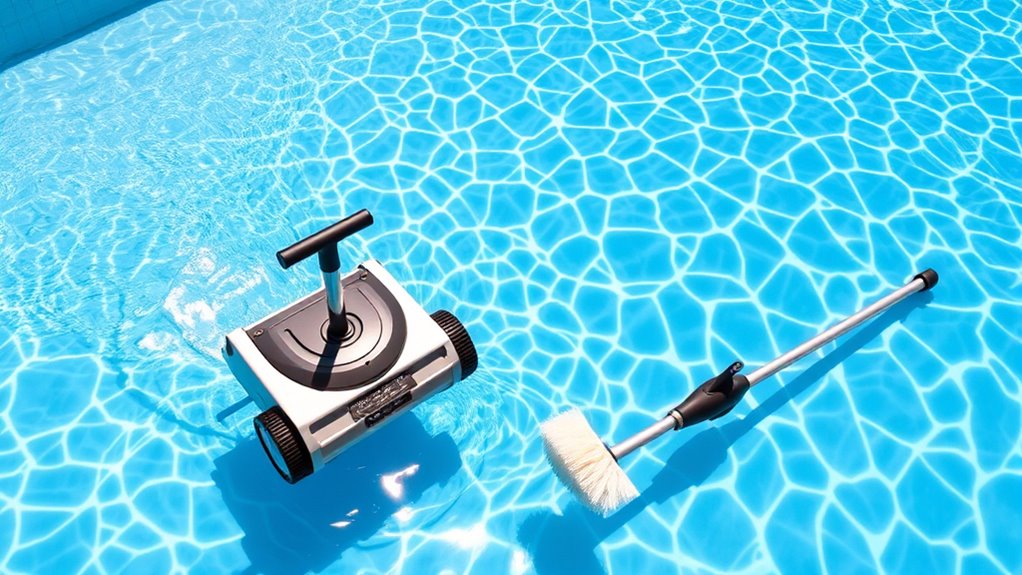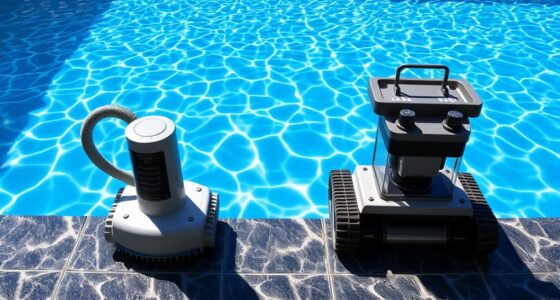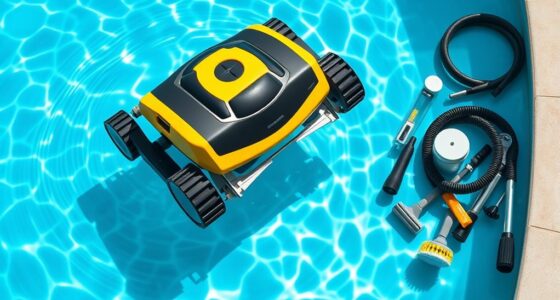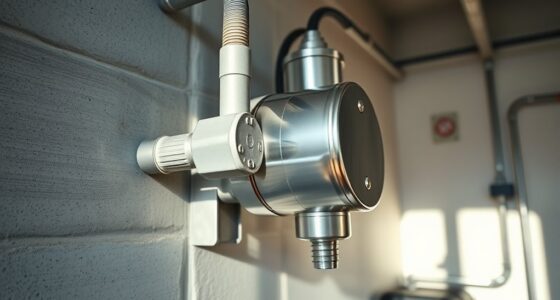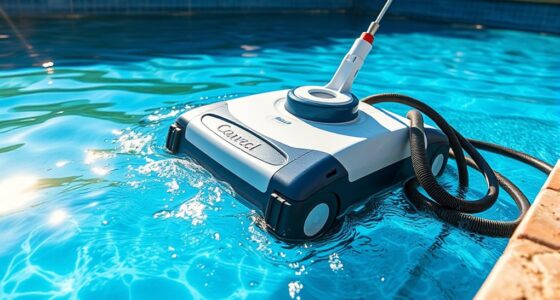Choosing between manual and automatic pool cleaning depends on your needs and budget. Manual cleaning gives you precise control but is time-consuming and physically demanding. Automatic cleaners save time and effort but can face issues like filter clogs and navigation problems, often costing more upfront. Your decision hinges on pool size, budget, and maintenance preferences. If you want detailed insights on costs and tips, keep exploring how both methods compare to find the best fit for you.
Key Takeaways
- Manual cleaning offers precise control but is time-consuming and physically demanding; automatic cleaners save effort but may miss spots.
- Automatic pool cleaners have higher upfront costs but reduce ongoing labor and maintenance expenses over time.
- Manual methods allow better chemical balance control; automatic systems help maintain water quality with minimal manual intervention.
- Automatic devices can struggle with filter clogs and navigation issues, requiring occasional manual adjustments.
- Cost considerations depend on pool size, user skill, and budget, influencing whether manual or automatic cleaning is more suitable.
Understanding Manual Pool Cleaning Techniques
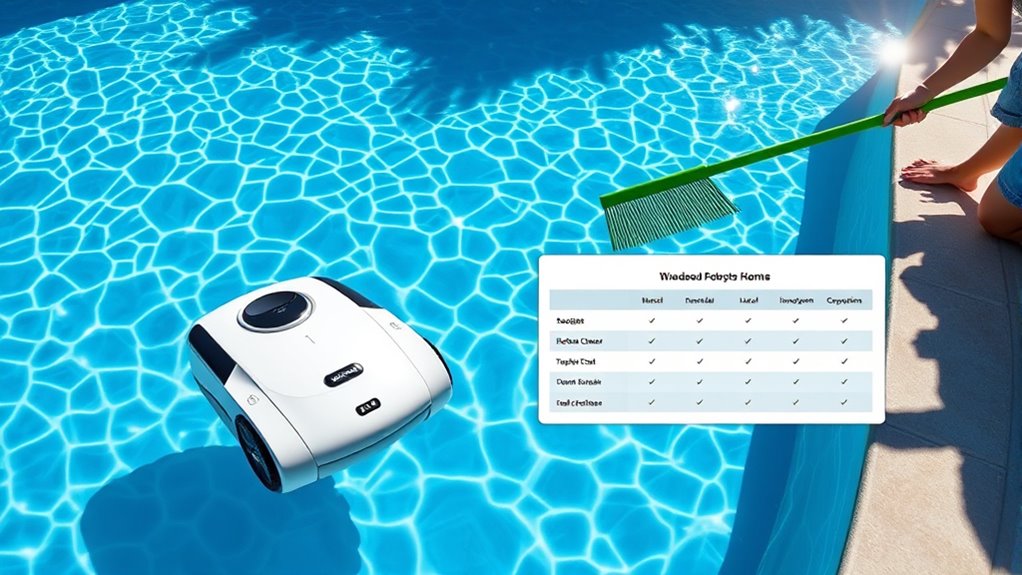
Manual pool cleaning involves a hands-on approach that requires you to actively remove debris and maintain water clarity. You’ll need to regularly skim the surface using a net or skimmer, ensuring leaves, insects, and other debris don’t sink or clog filters. Proper skimmer operation helps keep the water clean and reduces strain on your filtration system. Additionally, maintaining the pool’s chemical balance is essential to prevent algae growth and keep the water safe and clear. You’ll test the pH, chlorine, and alkalinity levels frequently, adjusting chemicals as needed. While manual cleaning demands time and effort, it gives you direct control over your pool’s cleanliness. This approach is effective for spot cleaning and addressing specific issues without relying on automated devices. Incorporating artistic elements into your pool area, such as decorative skimmers or custom pool liners, can enhance the overall aesthetic while maintaining cleanliness. Moreover, understanding city-specific factors like local weather patterns and water quality can help optimize your manual cleaning routine for better results. Being aware of industry trends in pool maintenance can also help you adopt new techniques for more efficient manual cleaning. Additionally, paying attention to water quality can help prevent issues like algae growth and ensure clearer water.
Exploring Automatic Pool Cleaning Devices
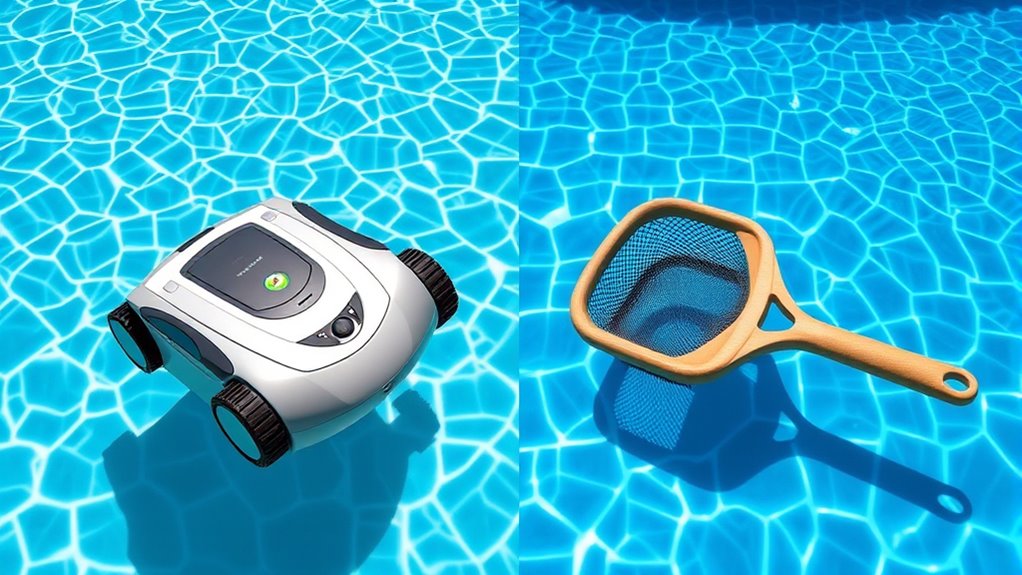
Automatic pool cleaning devices come in various types, from robotic cleaners to suction-side and pressure-side systems, each offering different benefits. For those interested in optimizing performance, Ford Tuning techniques can be applied to certain equipment to improve efficiency and lifespan. Additionally, understanding relationships such as clear communication and proper maintenance routines can significantly extend the life and effectiveness of your pool equipment. Regularly inspecting and maintaining your pool equipment is essential to prevent costly repairs and ensure optimal operation. Using filter replacement strategies at recommended intervals can also enhance cleaning efficiency and prolong device lifespan. Selecting the right sprayer tips and accessories, like strainers and extension wands, can also improve cleaning results and reduce equipment wear.
Types of Devices
When it comes to automatic pool cleaning devices, you have several options to choose from, each designed to make maintenance easier and more efficient. Robotic technology dominates this category, offering devices that independently navigate your pool, scrub surfaces, and filter debris. These robots often come with programmable features and sensors for thorough cleaning. On the other hand, manual tools like suction-side and pressure-side cleaners require more hands-on effort but can be effective for smaller pools or spot cleaning. Some models combine robotic tech with manual operation, giving you flexibility. The key is selecting a device that fits your pool size, shape, and cleaning needs. With these options, you can maintain a cleaner pool without the constant effort of manual brushing and skimming.
Maintenance Requirements
While automatic pool cleaning devices are designed to simplify maintenance, they still require regular attention to keep them functioning ideally. You need to monitor water chemistry and perform chemical balancing to prevent algae buildup and scale formation, which can impair device performance. Regularly inspect and clean the device’s brushes, filters, and sensors to ensure optimal operation. Although these devices handle routine debris removal, they aren’t a substitute for maintaining proper chemical levels. Failing to keep water chemistry balanced can lead to cloudy water, algae growth, and equipment damage. Additionally, a periodic check of the device’s components ensures longevity and efficiency. Proper maintenance of your pool’s filtration system is crucial for overall water quality and equipment durability. Staying on top of these maintenance tasks helps your automatic cleaner work effectively, reducing manual intervention and prolonging its lifespan. Properly maintaining your pool’s filtration system and understanding cleaning routines can significantly enhance overall water quality and equipment durability. Recognizing the importance of proper equipment maintenance can also prevent costly repairs and extend the lifespan of your pool cleaning devices. Incorporating scheduled routine inspections into your maintenance plan can further ensure consistent performance and prevent unexpected breakdowns. Regularly updating software or firmware on your automatic cleaner can also improve functionality and fix existing issues.
Benefits of Manual Pool Maintenance
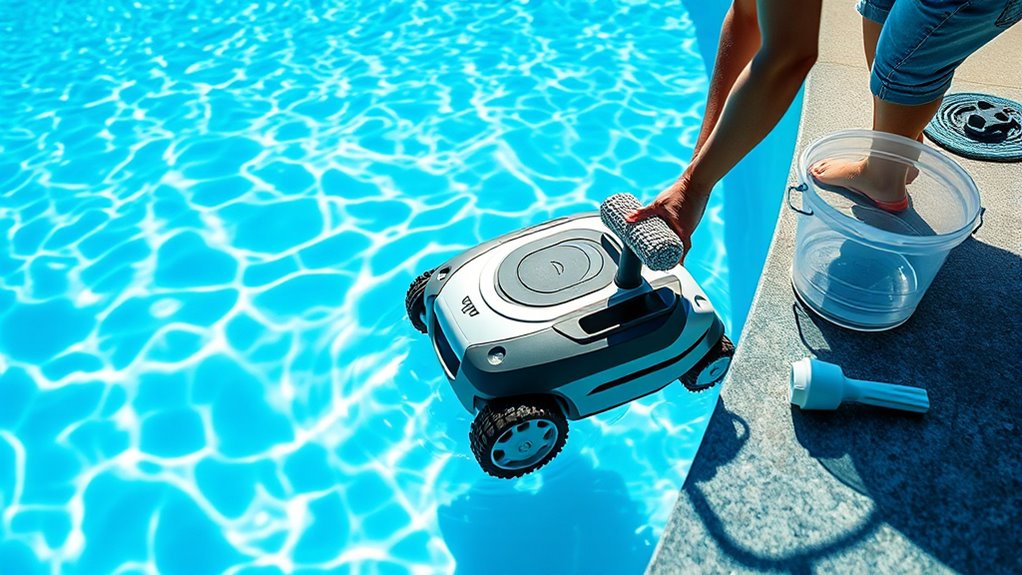
Manual pool maintenance offers you a level of control that automated systems often can’t match. By handling tasks yourself, you can precisely manage your pool’s chemical balance and perform seasonal maintenance tailored to your needs. This hands-on approach allows quick adjustments to water chemistry, ensuring a safer, clearer pool. It also helps you spot issues early, like algae growth or equipment wear, preventing costly repairs. Additionally, understanding the benefits of an eye patch can be valuable in personal skincare routines, highlighting the importance of tailored solutions. Engaging directly with your pool’s maintenance can also increase your overall pool knowledge, leading to better care and longevity of your equipment. Moreover, developing DIY skills through manual maintenance can save you money over time and provide a greater sense of satisfaction in caring for your pool. Regularly inspecting your pool equipment enhances your ability to perform preventative maintenance, reducing unexpected failures.
Advantages of Automatic Pool Cleaners
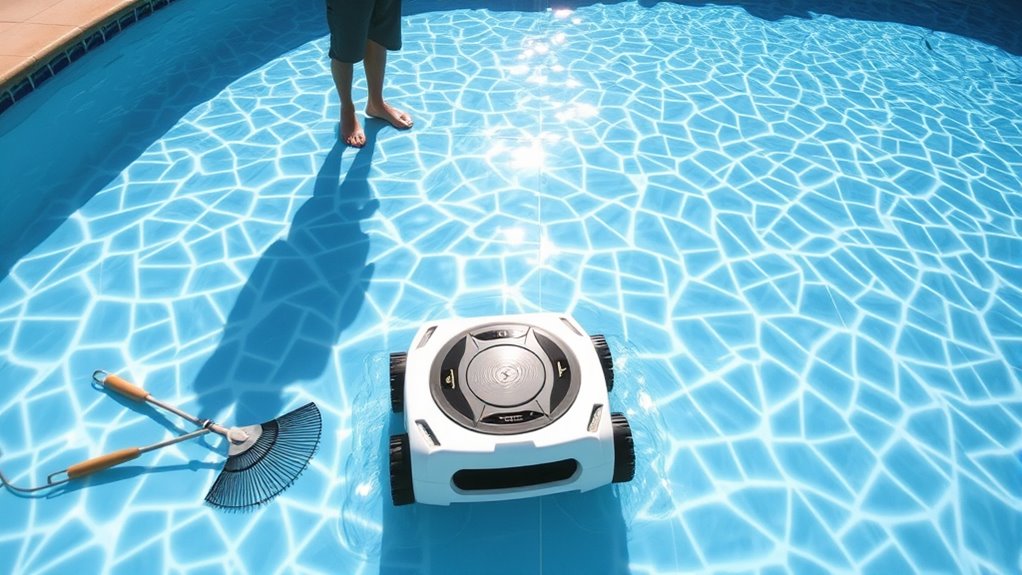
Automatic pool cleaners offer a convenient way to keep your pool spotless with minimal effort on your part. They efficiently navigate your pool, removing debris and dirt without constant supervision. This helps you maintain proper pool chemical balancing since fewer contaminants enter the water, reducing chemical adjustments needed. Automatic cleaners also save you time during seasonal maintenance, preventing buildup that can lead to algae growth or water imbalance. With consistent cleaning, you spend less time scrubbing surfaces or vacuuming manually. Plus, many models adapt to different pool shapes and sizes, ensuring thorough coverage. Overall, these devices streamline your pool care routine, making it easier to enjoy clean, clear water all season long without the hassle of manual labor. Incorporating automatic pool cleaning systems into your routine can also improve efficiency and help maintain water quality consistently.
Potential Drawbacks of Manual Cleaning Methods
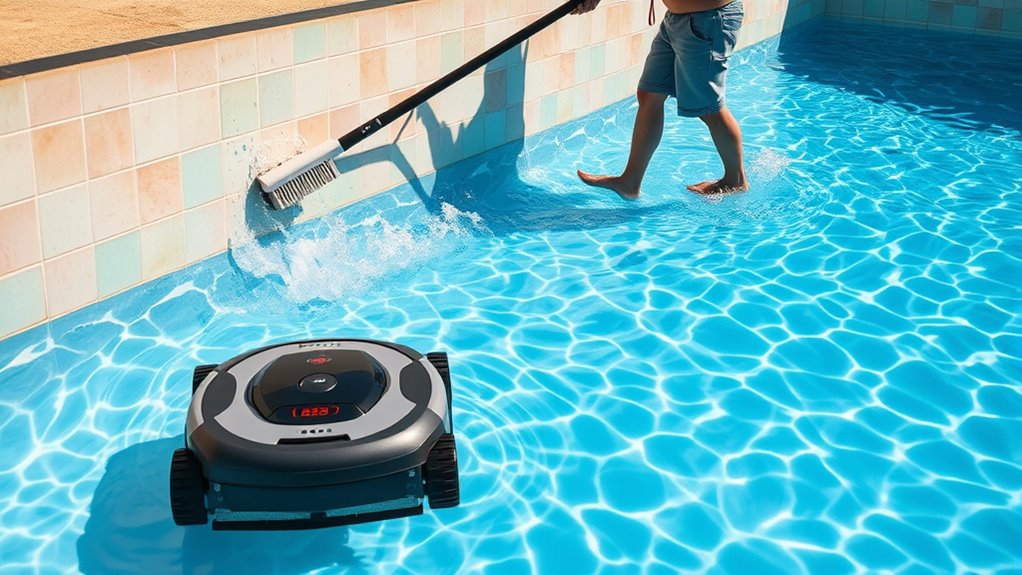
Manual cleaning methods can be time-consuming and physically demanding, often requiring frequent effort to keep your pool water clear. This manual labor can lead to user fatigue, especially after long sessions of scrubbing, skimming, and vacuuming. You may find yourself spending hours on maintenance, which can interrupt your free time and become tiresome over time. Additionally, manual cleaning relies heavily on your physical strength and stamina, making it less effective for large or heavily soiled pools. The inconsistency in cleaning quality may also be a concern, as fatigue can lead to missed spots or incomplete debris removal. Regular manual cleaning sessions can also disrupt your daily routine, reducing overall efficiency, and enjoyment of pool ownership. Using outdated manual techniques can further diminish cleaning effectiveness and increase the effort required. Overall, these drawbacks highlight how manual methods demand considerable effort and can diminish your enjoyment of pool ownership.
Common Challenges With Automatic Cleaners
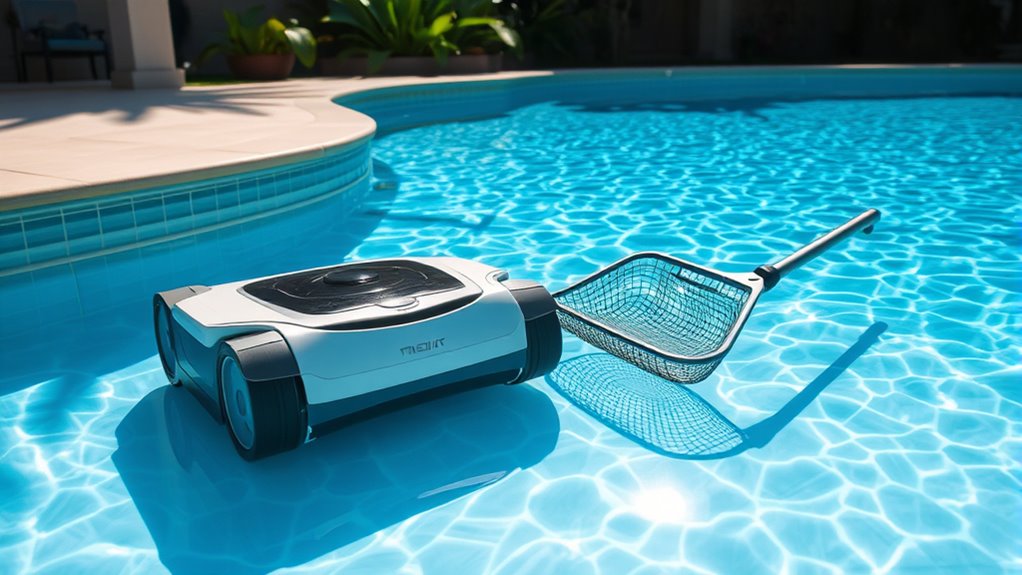
While automatic pool cleaners offer convenience, they can present their own set of challenges that may affect their effectiveness. One common issue is filter clogs, which occur when debris blocks the filter, reducing suction power and cleaning efficiency. Regular filter maintenance is essential to prevent this problem. Navigation issues are another frequent obstacle; some cleaners struggle to maneuver around the pool or miss spots altogether. This can lead to uneven cleaning and extra effort on your part. Additionally, certain models may get stuck on ladders, drains, or steps, requiring manual intervention. Understanding these challenges helps you anticipate potential problems and perform routine maintenance, ensuring your automatic cleaner operates smoothly and keeps your pool consistently clean.
Cost Analysis: Manual vs. Automatic Pool Cleaning
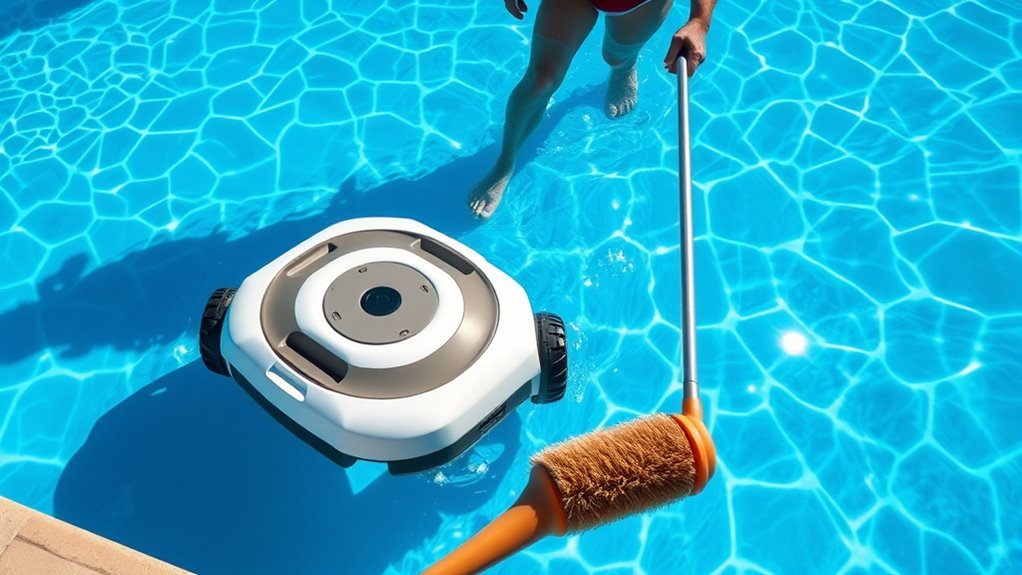
When comparing the costs of pool cleaning options, it’s important to contemplate both upfront investments and ongoing expenses. Manual cleaning typically requires a lower initial cost but can add up over time with supplies and labor. Automatic cleaners, while pricier upfront, often reduce ongoing maintenance and labor costs. Your budget considerations play a key role here, especially when factoring in long-term savings. Additionally, think about environmental impact; manual cleaning may use fewer energy resources, whereas automatic cleaners can consume more electricity.
Manual cleaning costs less upfront but may increase expenses over time; automatic cleaners save labor but use more energy.
Consider these cost factors:
- Purchase price of equipment
- Replacement parts and maintenance
- Labor costs
- Energy consumption
- Long-term savings versus initial investment
Factors Influencing Your Choice Between Both Methods
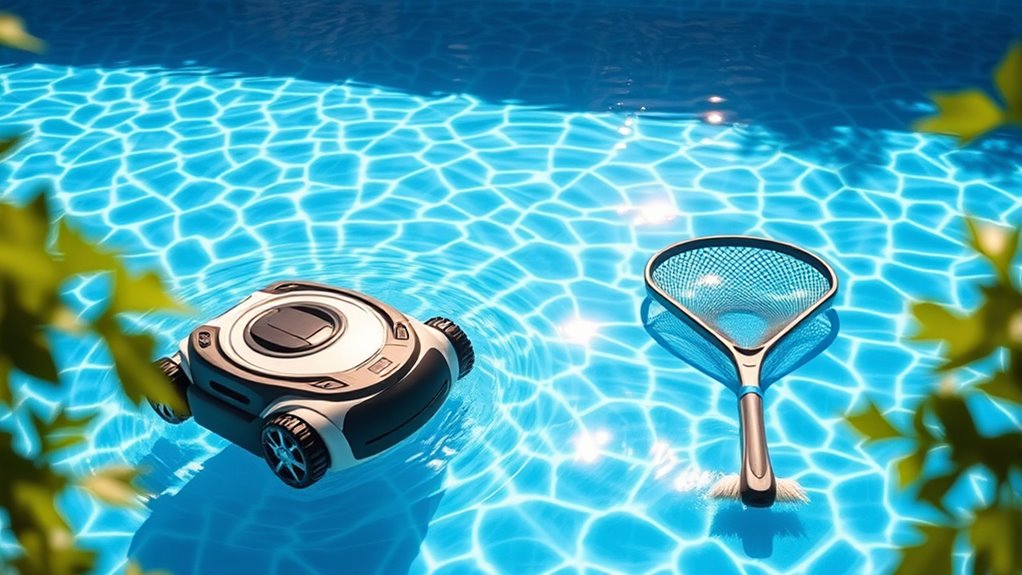
Your choice between manual and automatic pool cleaning methods depends on several key factors that align with your specific needs and circumstances. Pool size considerations play a significant role; larger pools may benefit from automatic cleaners to save time, while smaller pools can be effectively handled manually. Your user skill level also influences your decision—if you’re comfortable operating advanced equipment, automatic systems might suit you better. Conversely, if you prefer hands-on control or want a low-maintenance approach, manual cleaning could be more appropriate. Additionally, your budget and willingness to learn new tools matter. Evaluating these factors helps you choose the most efficient, cost-effective method that fits your lifestyle and pool requirements.
Tips for Efficient Pool Maintenance Regardless of Method
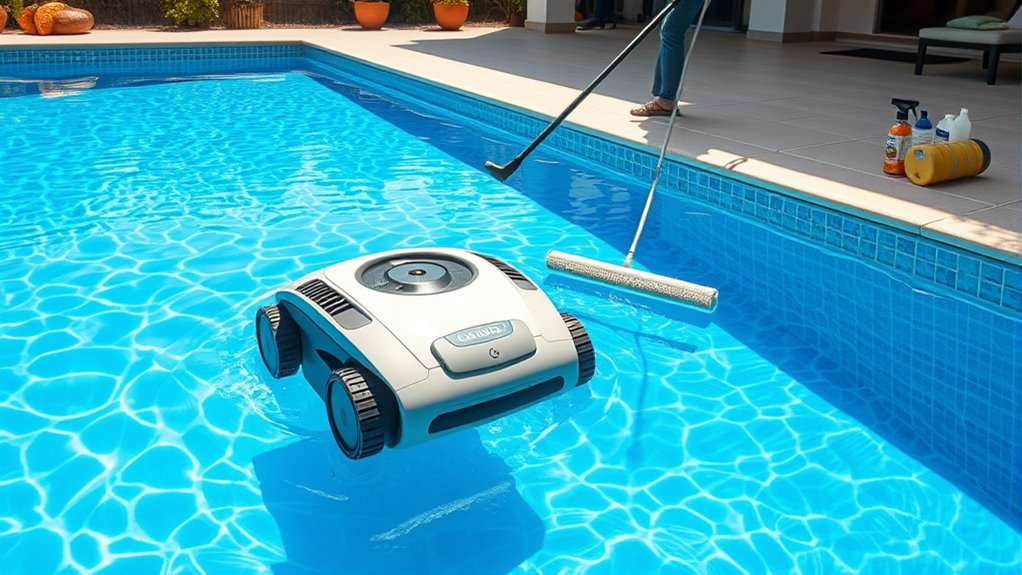
Maintaining a clean and healthy pool requires consistent effort, regardless of whether you choose manual or automatic methods. To keep your pool in top shape, prioritize proper pool chemistry by regularly testing and balancing chemicals. Always follow safety precautions, like handling chemicals carefully and keeping children away. Here are some tips for efficient maintenance:
Consistent pool maintenance and proper chemical balance ensure a safe, inviting, and long-lasting swimming environment.
- Check and adjust pH and chlorine levels weekly
- Skim debris daily to prevent buildup
- Clean filters regularly for ideal performance
- Use automated systems to reduce manual work
- Keep safety equipment accessible and in good condition
Staying on top of these tasks ensures your pool remains inviting and safe, no matter your cleaning method. Proper pool chemistry and safety precautions are key to avoiding problems and prolonging equipment life.
Frequently Asked Questions
How Often Should I Switch Between Manual and Automatic Cleaning Methods?
You should switch between manual and automatic cleaning based on your pool’s cleaning frequency and maintenance scheduling needs. Typically, use automatic cleaners for regular, routine maintenance to keep debris in check, while manual cleaning is ideal for detailed scrubbing and addressing specific spots. Adjust your approach depending on pool usage, weather, and debris buildup, ensuring your pool stays clean without overworking either method.
Are There Specific Pool Sizes Better Suited for Manual or Automatic Cleaning?
Your pool size influences whether manual or automatic cleaning works best. For smaller pools, manual cleaning offers better control and efficiency, letting you target specific spots. Larger pools benefit from automatic cleaners, which cover more area quickly and save time. Consider cleaning efficiency for your pool size; automatic cleaners excel in large pools, while manual methods suit smaller ones, ensuring your pool stays clean without excessive effort.
How Do Maintenance Costs Compare Over the Long Term for Both Methods?
Over the long term, automatic pool cleaning tends to be more cost-efficient because it reduces maintenance frequency and saves you time, although initial costs are higher. Manual cleaning may have lower upfront expenses, but you’ll spend more on labor and supplies over time. Consider your pool size and maintenance habits to determine which method offers better cost efficiency for your needs.
Can Manual and Automatic Cleaners Be Used Together Effectively?
Coincidentally, using manual and automatic cleaners together can be quite effective in a multi-method cleaning approach. You get the best of both worlds—automatic cleaners handle routine, hard-to-reach spots, while manual cleaning tackles stubborn stains and detailed areas. This hybrid pool maintenance guarantees a cleaner, healthier pool, reduces wear on your automatic device, and offers flexibility. Combining methods maximizes efficiency and keeps your pool pristine with minimal hassle.
What Are the Environmental Impacts of Manual Versus Automatic Pool Cleaning?
When comparing the environmental impacts of manual and automatic pool cleaning, you find that manual cleaning often uses fewer resources, making it more eco-friendly. You can choose eco-friendly alternatives like solar-powered or energy-efficient automatic cleaners. Manual cleaning also offers water conservation benefits, as it minimizes water waste. By selecting environmentally conscious options, you help reduce your pool’s ecological footprint, making your maintenance practices more sustainable and responsible.
Conclusion
Choosing between manual and automatic pool cleaning depends on your needs and budget. While automatic cleaners might seem costly upfront, they save you time and effort in the long run. Don’t worry about complexity—many models are easy to operate, even for beginners. With the right method, you’ll keep your pool sparkling effortlessly. So, pick what’s best for your lifestyle and enjoy a pristine pool without the hassle.
